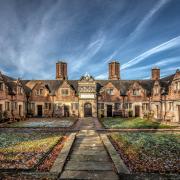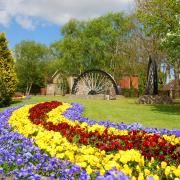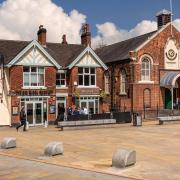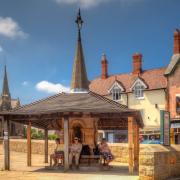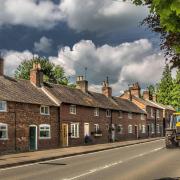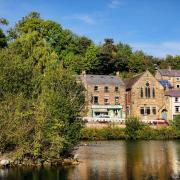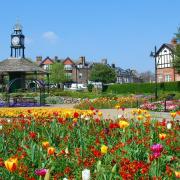Mike Smith reveals the recent changes in his vibrant, friendly and fondly regarded home town

Chapel-en-le-Frith has been subject to more changes in the last decade than at any time in its 790-year history. Approval has been granted for the building of more than 900 new houses, many of which have already been built. Considerable commercial and industrial development has taken place on the eastern perimeter of the town, a second supermarket has opened and lots of new eating places and independent specialist shops have given the town fresh purpose and new vibrancy.
Although, in the words of the new Nobel Laureate, Bob Dylan, ‘the times are a-changing’, the ancient core of Chapel-en-le-Frith is remarkably unchanged. The cobbled Market Place retains its weathered market cross, its Cromwellian stocks, its restored war memorial, now illuminated by four ornamental lamps, and its stone cattle trough, installed to mark Queen Victoria’s Diamond Jubilee. Steep, cobbled Church Brow, with its old houses descending in echelon, retains its appearance as one of the most photogenic streets in the county and the parish church stands on the very spot where the first chapel in the Royal Forest of the Peak, a ‘chapel-en-le-frith’, was founded in 1225.
Anxious to preserve this heritage and fearful that unrestrained new housing developments would place an intolerable strain on the local infrastructure and intrude on the beautiful setting of the town, residents got together in 2012 to form ‘Chapel Vision’. Their aim, backed by the Parish Council, was to draw up a development plan setting out the town’s future needs with regard to transport, environment, infrastructure and housing. As a result, Chapel-en-le-Frith became one of the first places in the country to draw up a ‘Neighbourhood Plan’.
Crucially, the community group identified areas for new housing that would not intrude on the rising land that frames the settlement. Endorsed in a referendum and adopted by all the local authorities, the plan now forms a binding framework for development in the parish over the next 15 years.
Like every other place in the country, Chapel has witnessed a massive change in lifestyle, not only in shopping habits, but also in the tendency for people to enjoy ‘eating out’. Ever since the Vecchia Italia opened 28 years ago, the town has developed into a great place in which to eat out. It has a second Italian restaurant and others serving Indian, Chinese, Greek, Spanish and English food.
The number of cafés in the town has also grown in recent years, with the latest addition being Kouros, which serves authentic Greek food and drink alongside English snacks. Owner Karen Taylor lived in Greece for ten years and is married to a Greek. Accounting for her English surname, Karen said: ‘Since 1983, married women in Greece have been required to use their birth name.’
Name changing has been taking place in two of the town’s well known venues. The Fallow Deer, a pub/restaurant located alongside the A6 by-pass, has been refurbished, put under new management and rechristened The Fickle Mermaid, a name based on the legend of a mermaid who lived in a pool below Kinder Scout and lured men to their death by her enchanting singing. In the town centre, the Dog Inn, originally called The Talbot, has acquired its third name. After receiving a makeover, it was re-christened ‘The Cobbles’ and re-launched as a wine and cocktail bar.
One pub and restaurant that did close down was the King’s Arms in the heart of the ‘Old Town’, but it too has been refurbished by new owners. In fact, Chapel has bucked the national trend for pubs to close at an alarming rate. Six other pubs are still serving good food and drink, and there is a popular café bar and restaurant called Rems. A new micro pub is about to open in the Market Place and the owner of the Post Office, Tim Boothman, sells six beers from his expanding micro-brewery.
Another national trend that does not apply to Chapel is the closure of libraries and bookshops. The town has retained its public library and it has a thriving independent bookshop called Reading Matters, run by Sue Taylor and Lyndsay Noden. Explaining why the pair set up the shop in 2012, Sue said, ‘We were inspired by May Sarton’s book The Education of Harriet Hatfield, which describes how a widower turned around her own life and that of a neighbourhood of Boston by setting up an independent bookshop that became the hub of the community. With its author events, creative writing and reading groups, our shop has become a hub of the Chapel community.’
It might be thought that the presence of Morrison’s and Aldi supermarkets would have devastated the high street, as has happened in so many towns, but this is not the case. Chapel is lucky in having long-established and widely respected shops, such as Joyce Hall’s Mica Hardware, Foster’s greengrocers, deli and floristry and Bywater’s gas appliances, as well as a butcher’s. Barbers, hairdressers, beauty salons, gift shops, a vintage sweetshop, a pet shop and a carpet shop all occupy niches not filled by the supermarkets. Very recently, new shops have appeared run by people who realise that a way to face off competition from supermarkets and on-line retailers is to foster community involvement.
Julia Alsop, a very enthusiastic lady with a lifelong passion for patchwork, opened ‘Patchworks and More’ over two years ago. She hosts patchwork-making classes twice per day on five days a week, with participants ranging in age from 22 to 82. Gail Dippnall, who is equally passionate about sewing and knitting, has opened a haberdashery in a tiny building where the parish hearse was once kept. Like Julia, she shares her passion with the community by running a knitting and crochet club.4
Another shop with lots of community involvement is the itsy Bitsy Boutique, set up by Michaela Daniels who decided, after the early death from cancer of her brother, to give up her steady job and make the most of her own life by fulfilling a long-held ambition of opening a boutique. Her shop sells an imaginatively-displayed range of ladies’ fashion accessories and hosts regular ‘Sip and Shop Nights’, where Michaela raises lots of money for various charities, including cancer charities.
Julie Holmes is a very enterprising Chapel resident who started selling handmade natural soaps and fragrances 14 years ago. Her business, Wild Olive, has mushroomed so much that she now sells to some 300 shops. She recently relocated her manufacturing base to a spacious building in her home town, where she employs ten people and has a gift shop that sells her products. She also puts on sessions where people in the community can try their hand at soap-making.
Another success story is Rubicon, founded by Leon Woodward, who began selling watches at markets and shows 35 years ago. His business started to expand when he began trading on ebay in 2004, but really took off in 2010, when he and his son Gareth were given a contract by Amazon to sell Seiko products. They are now the largest independent retailers of Seiko products in the North of England, with an annual turnover of more than £1million. The former NatWest building in the Market Place has become their new distribution centre and shop.
An even more remarkable success story is Street Crane, founded 70 years by Peter Street, an ex-fighter pilot. The firm started out in Sheffield by repairing cranes, before embarking on the making of them. In 1957, Street Crane relocated to Chapel-en-le-Frith, where the company makes overhead travelling cranes, with some 65 per cent of revenue coming from exports. Peter’s son, Martin, the chairman of the company, said, ‘In more than one sense, the firm is a family business, with many local families having several members, and indeed several generations, working here.’
Street Crane has grown into a firm with a £30 million turnover, and its manufacturing capacity has now been increased even more by the construction of a £3 million extension for the production of hoists. Not bad for a company that started out with Peter Street’s £88 gratuity from the RAF.
Chapel-en-le-Frith is still known as the home of Ferodo (now part of Federal Mogul), the famous manufacturer of brake linings, but several new companies have been established on the eastern edge of the town, just before it gives way to the hills of the High Peak. They include Peakdale Molecular, a provider of ‘discovery services’ for the pharmaceutical industry. This is yet another example of the enterprising new businesses, both big and small, that illustrate how much times are a-changing in the ancient town of Chapel-en-le-Frith.
The second, updated and revised edition of Chapel-en-le-Frith through Time by Mike Smith is published by Amberley at £14.99.










